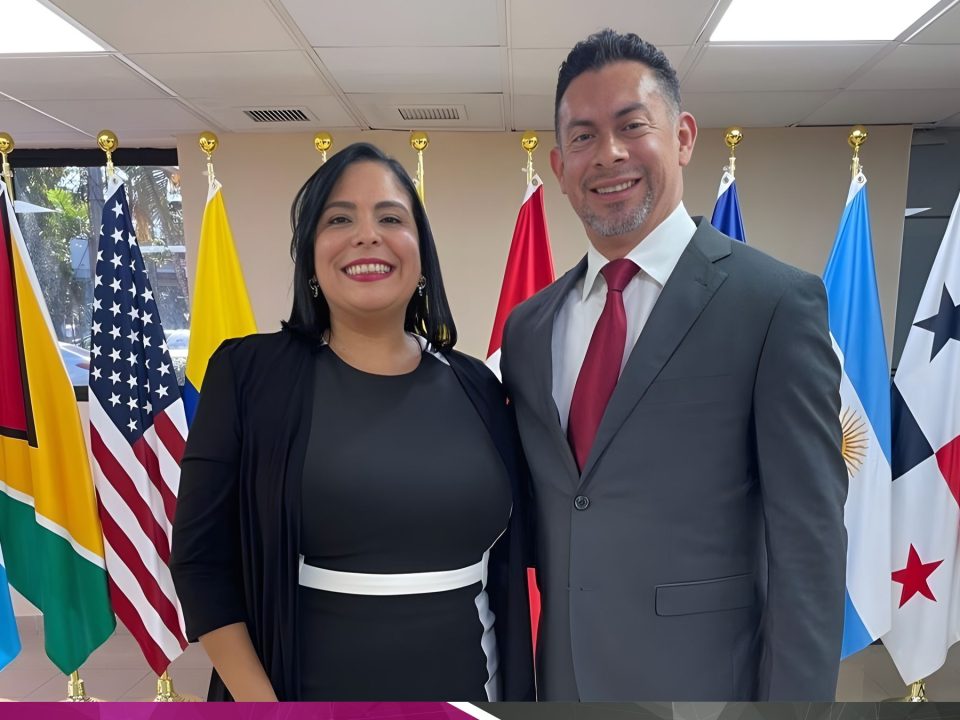
Icaza participates in the 19th International Copyright Seminar
18/08/2025
Icaza recognized in Chambers Latin America 2026
21/08/2025Article by Ingrid Rojas – Interview with Luis Chalhoub for LexLatin

In an environment where financial crime is constantly evolving, Panama must maintain active vigilance, keep its regulatory frameworks updated, and strengthen its compliance culture, according to Luis Chalhoub, a partner at Icaza, González-Ruiz & Alemán.
Panama was recently removed from the European Union’s list of high-risk jurisdictions, a list it entered in 2020 due to strategic deficiencies in its anti-money laundering (AML) and counter-terrorist financing (CTF) regime.
The announcement was made on July 9 with the approval of Delegated Act C (2025) 3815, through which the European Parliament amended Delegated Regulation (EU) 2016/1675. This regulation created the EU list on July 14, 2016, using the Financial Action Task Force (FATF) lists as a reference.
The Ministry of Economy and Finance stated, “This decision reflects the international community’s confidence in the reforms implemented and Panama’s capacity to guarantee transparency and effective cooperation.”
About 30 nations remain on the list of third countries that pose a high risk to the European Union’s financial system based on a methodology developed in 2020. The list is updated periodically, with some countries exiting and others entering. On August 5 of this year, Angola, Algeria, Ivory Coast, Laos, Lebanon, Monaco, Namibia, Nepal, and Venezuela were added.
Steps Taken to Address Past Lags
In 2023, after four years, the country also celebrated its exit from another list, that of the FATF, whose recommendations are also considered by the European Union, which is a member of the organization.
The FATF’s international recommendations and standards are aimed at promoting the proper use of the global financial system, so countries must implement them as enforceable policies and actions, explains Luis Chalhoub.
The organization, created in 1989, periodically conducts reviews to determine whether countries are complying. By 2020, Panama was “somewhat behind.”
According to Chalhoub, out of FATF’s 40 recommendations, the most relevant for Panama were: updating its legislative framework, identifying beneficial owners, strengthening asset-freezing measures, and improving international cooperation.
He estimates it took Panama more than two years to complete the update process. Afterward, the country had to wait for inspections, reviews, and reports before finally exiting the FATF list.
- LexLatin: Regarding the country’s exit from the EU’s gray list, what progress has been made in regulatory matters?
Luis Chalhoub: In Panama, the financial sector is regulated by different regulatory bodies. The banking sector has its regulator, the Superintendency of Banks. The securities market also has its regulator, the Superintendency of the Securities Market (SMV). And the insurance sector has the Superintendency of Insurance and Reinsurance.
Some activities were left out that were not subject to direct regulation by these three regulatory bodies, so a Superintendency of Non-Financial Subjects was created to encompass certain other activities that were not subject to a specific regulator but could pose a risk of misuse of the financial system for money laundering purposes. The regulatory changes are reflected throughout the individual regulations of each of these sectors. The banking sector had to adapt or update its regulations, as did the securities market and the insurance sector.
According to the partner, deficiencies related to international cooperation stemmed from the fact that requests for information exchange were not being processed promptly enough. However, he emphasizes that corrective measures were taken, additional staff were hired to handle the matter, and a risk-based system and compliance manuals were adopted.
“The necessary measures to know the client were detailed with greater precision, as were all the reports that need to be made,” he notes.
- In the meantime, how did the country deal with the consequences of being on this list?
LCh.: Being on these lists causes problems. I would say it can be summarized in two main ways. The effect of being on a list like this, in the worst-case scenario, is the inability to conduct international transactions, and in the best-case scenario, it slows down the execution of international commercial and financial transactions. Since all countries are subject to the same standard and are required to know their clients and evaluate the risks of dealing with a person who has certain characteristics, more security measures must be taken or more investigations must be carried out. The mere fact that Panama, or any country, is on a gray list forces any counterparty in any transaction to take additional measures with respect to companies domiciled in that country when conducting transactions or doing business. It imposes a burden on both the counterparty and the company in Panama, which will be required to provide more information and explanations than would normally be requested.
Financial Cost
As Chalhoub points out, Panama’s economy is fundamentally service-based and depends on a good reputation to make its offerings attractive internationally. Thus, the poor image that being on the EU or FATF lists represented for the country was compounded by an increase in the cost of credit, which has been a factor considered by rating agencies and financial institutions when evaluating country risk.
The country has a financial center that depends, to a large extent, on correspondent banking relationships abroad, an operation that becomes difficult when the country is on any of the gray lists. According to the Superintendency of Banks, the International Banking Center (CBI) is on its way to consolidating itself as one of the fundamental pillars of Panama’s financial system.
Having lost its investment grade rating from some agencies or maintaining a negative outlook, according to the assessment of others, is another element that ends up impacting the cost of financing, Chalhoub notes.
However, he stresses that the country’s exit from the European Union’s gray list represents, to begin with, a cleaning of its image and reputation and a recognition of the effort it has made to align itself with international standards.
The expectation now is that this news will stimulate foreign investment in the country because the ease of doing business, like a good reputation, are factors that investors consider when trying to locate their capital.
“By not having obstacles that make it difficult to carry out transactions, and by making it easier or less costly to comply with ‘know your client’ standards and the informative burden of proof that must be provided to establish commercial or financial relationships, Panama is once again on investors’ radar as a place where investments can be made,” he emphasizes.
Continuous Work
- What measures should the country take to maintain its stance against money laundering and terrorism financing?
LCh: This is an ongoing process; it doesn’t have an end for a very simple reason: criminals are dedicated to studying ways to circumvent the obstacles that legislation and regulators put in place to prevent the misuse of the financial system. On the one hand, there are regulators and countries, states, establishing policies and regulations to prevent the misuse of the financial system, and on the other hand, criminals are working to find methods to get rid of those obstacles or restrictions imposed on them. This forces countries and all international organizations to constantly review and adopt standards to prevent them from becoming obsolete and ineffective in the short term.
Chalhoub’s recommendation is that countries should always review international standards and adapt to new realities, trying to close any loopholes and gray areas that may exist to prevent criminals from misusing the financial system.
- Where should the focus be in a changing and challenging context, and what are the challenges in this area?
LCh: This is an issue that requires constant vigilance. Panama is always willing to cooperate, listen, and stay up to date with the updates that are being carried out and to transmit all that information, all those requirements, and all these new standards to the different internal regulatory bodies so that they can adapt their regulations or take the necessary corrective actions.
The Role of Compliance
For Chalhoub, compliance is now quite common in Panama because regulations require regulated entities in the financial sector—banks, insurance companies, reinsurers, and brokerage firms—to have a compliance officer responsible for ensuring that the entity complies with anti-money laundering regulations.
He recounts that, at first, it was a bit problematic because there were not enough people with the capacity to fill such a position due to the training and knowledge it required, but that reality has changed.
“People are now used to it. Of course, there will always be someone who gets annoyed when they are required to provide a series of documents to support the ‘know your client’ policy or when they are asked for explanations, for example, about the origin of funds. But they are becoming fewer and fewer because I think everyone understands that this is part of the rules of the game.”
The partner at Icaza highlights that the challenge is to always stay updated, not only with regulations but also with risks, because criminals do not rest and have sufficient funds to pay trained people with enough knowledge to try to circumvent regulations. You must always be very attentive to the new methods that criminals intend to implement. Otherwise, since this is a very dynamic, very changing world, he believes that the compliance officer would become obsolete and ineffective in the very short term.
Compliance officers are also required to remain permanently updated through continuous education and to pass on that knowledge to the company’s employees, since they need to be made somewhat aware that everyone must, in some way, contribute to assessing and preventing risks.
Pending Reforms?
Regulated sectors in Panama are governed by Law 23 of 2015, which establishes policies for the prevention of money laundering, terrorist financing, and the financing of the proliferation of weapons of mass destruction. The law was reformed between 2023 and 2024, which forced regulated entities to adapt to these legislative changes. But in addition to complying with a general regulation like this, they must also comply with the regulations of their specific sectors.
“At the moment, I believe that most of the regulated financial sectors have their legislation adapted to the most recent regulations, which in turn are aligned with the standards,” Chalhoub notes.
- What are the firm’s recommendations for its clients given these challenges for companies in Panama?
LCh: To stay updated with regulations, to remain informed, and not to spare resources to keep their compliance officers and staff updated, because it is the only way to prevent, and properly assess risks, depending on the economic sectors they are part of.
For lawyers, considered non-financial subjects under the supervision of the Superintendency of Non-Financial Entities, the law requires them to implement ‘know your client’ and prevention policies and regulations. They are also subject to sanctions, recently increased to as much as USD 1 million. This means lawyers must thoroughly know their clients and the origins of their funds, especially in structuring legal vehicles such as companies and foundations, which could otherwise be misused.
In addition to the controls that are carried out, he adds the implementation of accounting records, requiring clients to provide accounting information that indicates who keeps the accounting records, and having that information available to address, for example, information exchange requirements when applicable.








